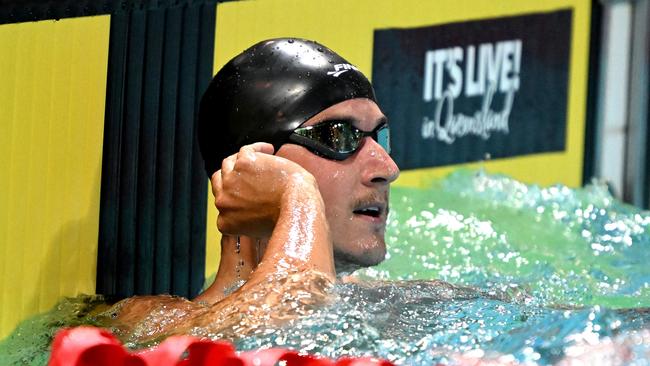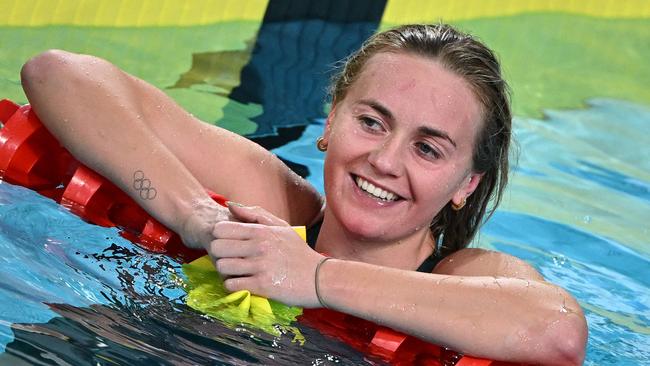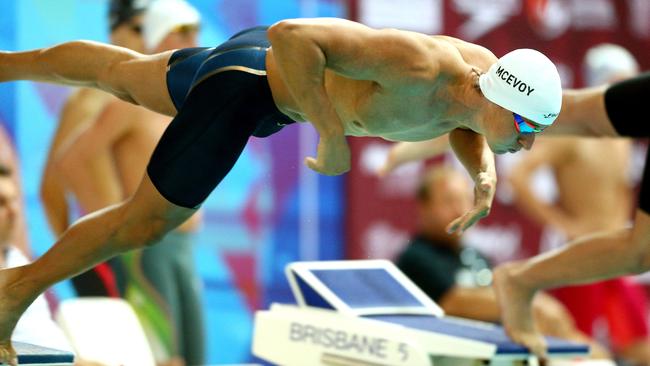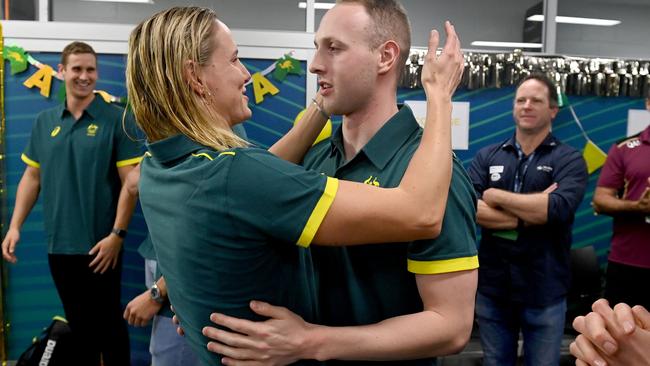Olympics honeymoon over as Swimming Australia reinstates brutal selection policy
Fresh questions will be raised about whether administrators are placing unfair expectations on vulnerable young swimmers following the return of a ruthless selection policy.

Olympics
Don't miss out on the headlines from Olympics. Followed categories will be added to My News.
The same champion Australian swimmers who helped raise the nation’s sagging spirits during the darkest days of the pandemic have been given a harsh reminder that their Tokyo Olympic honeymoon is officially over.
Swimming has always been a cutthroat sport with little room for sentiment, but the shocking backflip on the national selection policy will raise fresh questions about whether administrators are placing unfair expectations on vulnerable young athletes.
With the pressure already mounting on the Dolphins to deliver another swag of medals at next year’s Paris Olympics, Swimming Australia team officials have quietly reneged on an earlier promise to ditch their ruthless selection policy for next month’s world championships in Fukuoka (July 23-30).
Already having to meet the extremely difficult qualification standards established by World Aquatics, Australia’s swimmers competing at next week’s trials in Melbourne (June 13-18) have been told they will have to clear an extra hurdle to be picked in the squad for Japan.
In addition to finishing first or second at the trials and dipping under the official qualifying standard, Australia’s swimmers also have to post a time that would have got them into the final at last year’s superfast world championships in Budapest.
The extra clause was canned last year after complaints it was robbing young Australians of their right to wear the green and gold after qualifying fairly, but head coach Rohan Taylor confirmed it had been reinstated for the trials.
“We’re making the world’s team tough to make,” Taylor said.
“We need some people to step up.
“If you look at most of the events we’re pretty good, but there’s obviously some soft ones.
“So for the most part, we‘ll get the team we want that will be able to really go there and have a red hot crack.”

Although Cate Campbell is a notable absentee, most of Australian swimming’s biggest names will be in Melbourne for the trials, including Emma McKeon, Ariarne Titmus, Kaylee McKeown, Mollie O’Callaghan, Kyle Chalmers, Zac Stubblety-Cook and Elijah Winnington.
While it’s expected Australia will still qualify swimmers in most individual events, it’s inevitable some will be left off after falling victim to SA’s insanely strict policy.
Of the 28 individual events where SA has installed its own qualifying standards, 18 are based on the last world championships while the other 10 are the times already listed for Paris in 2024.
In each event, the gaps are significant.
In the men’s 400 metres individual medley, the margin is almost five seconds. In the women’s 1500m freestyle, it’s more than 20 seconds faster.
His season best time is a slick 21.84 seconds — well inside the official qualifying time of 22.12 — but an agonising 0.01 outside Australia’s more difficult requirement of 21.83, which he will need to break in the final at the trials in order to be picked.

Australia’s Ben Armbruster is ranked eighth in the world this season in the 50m butterfly, but he faces a different selection plight.
Although 50m butterfly, 50m backstroke and 50m breaststroke are all long-established world championship events that count on the medals table, SA doesn’t pick competitors for those races because they are not on the Olympics program.
That means that even if Armbruster broke the world record at the trials, he still wouldn’t be chosen for the team.
It’s little wonder the policy has not been adopted by other swimming powers, including the United States, which has the best team in the world and believes that anyone good enough to make it deserves their chance.
Introduced by former head coach Jacco Verhaeren during the fallout that followed the Australian team’s disappointing results at the 2012 London Olympics, the contentious policy has already been slammed by some of the sport’s legends.
“It’s cutthroat enough to finish first or second at the trials but plenty of swimmers are pure racers that will improve when they get to the Olympics,” Lawrence said.
SA heard those complaints and agreed to bend the rules in 2021 to allow Matt Wilson to swim at Tokyo after he was caught out by the cold-blooded policy.
A former world record holder, Wilson made the official qualifying time but missed the harder Australian requirement by a heartbeat while grieving the passing of his grandmother Pam.
The sight of Wilson sobbing in the pool while being comforted by his teammates was highly distressing, and turned the spotlight on SA’s callous selection rules.
SA invoked its rarely-used compassion clause to pick Wilson for Tokyo then announced it was scrapping the selection policy for the 2022 world championships and Commonwealth Games.

The team performed exceptionally well at both international events so SA’s decision to reinstate the policy came as a surprise, though Taylor said it had been thought through and there was still some wriggle room.
With teenage sensations Summer McIntosh and David Popovici smashing world records in the past year, the standard of competition in Fukuoka is expected to be a huge step up from the last world championships and Olympics.
Taylor only wants the best of the best but said swimmers who just miss out will be offered other opportunities to compete at the World Cup series in Europe later this year and possibly next year’s world championships in Qatar.
He also said selectors would retain the flexibility to pick swimmers who miss out on their individual events to fill holes in the relays, which the Dolphins’ leadership is unashamedly targeting to boost the medal count in Paris.
Of the seven relays contested at the 2021 Tokyo Olympics, Australia won two gold and four bronze medals and with Fukuoka doubling as the first official qualifier for the Paris relays, that’s the immediate priority for this year.
“We‘ve got a lot of opportunities to really expose a lot of athletes to competition this next eight months and we want to do that in a really meaningful way,” Taylor said.
“But we also want to keep that standard up so when they go there, they‘re really trying to jump high to get in this team.
“We‘ll get a good look at how these guys really respond when you raise the bar again but when we get past it, we’ll look at the Paris times and compare to what the performances are like in Fukuoka.
“I have a feeling that the Paris Olympic qualifying times will be what they‘ll be because they’re pretty tough.”
Originally published as Olympics honeymoon over as Swimming Australia reinstates brutal selection policy



